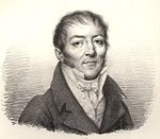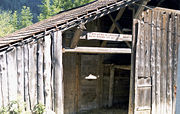
Alexis Bouvard
Encyclopedia

Astronomer
An astronomer is a scientist who studies celestial bodies such as planets, stars and galaxies.Historically, astronomy was more concerned with the classification and description of phenomena in the sky, while astrophysics attempted to explain these phenomena and the differences between them using...
. He is particularly noted for his careful observations of the irregularities in the motion of Uranus
Uranus
Uranus is the seventh planet from the Sun. It has the third-largest planetary radius and fourth-largest planetary mass in the Solar System. It is named after the ancient Greek deity of the sky Uranus , the father of Cronus and grandfather of Zeus...
and his hypothesis of the existence of an eighth planet in the solar system
Solar System
The Solar System consists of the Sun and the astronomical objects gravitationally bound in orbit around it, all of which formed from the collapse of a giant molecular cloud approximately 4.6 billion years ago. The vast majority of the system's mass is in the Sun...
.
Life
Born in Contamines, France, Bouvard's achievements included the discovery of eight cometComet
A comet is an icy small Solar System body that, when close enough to the Sun, displays a visible coma and sometimes also a tail. These phenomena are both due to the effects of solar radiation and the solar wind upon the nucleus of the comet...
s and the compilation of astronomical tables of Jupiter
Jupiter
Jupiter is the fifth planet from the Sun and the largest planet within the Solar System. It is a gas giant with mass one-thousandth that of the Sun but is two and a half times the mass of all the other planets in our Solar System combined. Jupiter is classified as a gas giant along with Saturn,...
, Saturn
Saturn
Saturn is the sixth planet from the Sun and the second largest planet in the Solar System, after Jupiter. Saturn is named after the Roman god Saturn, equated to the Greek Cronus , the Babylonian Ninurta and the Hindu Shani. Saturn's astronomical symbol represents the Roman god's sickle.Saturn,...
and Uranus
Uranus
Uranus is the seventh planet from the Sun. It has the third-largest planetary radius and fourth-largest planetary mass in the Solar System. It is named after the ancient Greek deity of the sky Uranus , the father of Cronus and grandfather of Zeus...
. While the former two tables were eminently successful, the latter showed substantial discrepancies with subsequent observations. This led Bouvard to hypothesis
Hypothesis
A hypothesis is a proposed explanation for a phenomenon. The term derives from the Greek, ὑποτιθέναι – hypotithenai meaning "to put under" or "to suppose". For a hypothesis to be put forward as a scientific hypothesis, the scientific method requires that one can test it...
e the existence of an eighth planet
Planet
A planet is a celestial body orbiting a star or stellar remnant that is massive enough to be rounded by its own gravity, is not massive enough to cause thermonuclear fusion, and has cleared its neighbouring region of planetesimals.The term planet is ancient, with ties to history, science,...
responsible for the irregularities in Uranus' orbit
Orbit
In physics, an orbit is the gravitationally curved path of an object around a point in space, for example the orbit of a planet around the center of a star system, such as the Solar System...
. The position of Neptune
Neptune
Neptune is the eighth and farthest planet from the Sun in the Solar System. Named for the Roman god of the sea, it is the fourth-largest planet by diameter and the third largest by mass. Neptune is 17 times the mass of Earth and is slightly more massive than its near-twin Uranus, which is 15 times...
was subsequently calculated from Bouvard's observations, independently, by John Couch Adams
John Couch Adams
John Couch Adams was a British mathematician and astronomer. Adams was born in Laneast, near Launceston, Cornwall, and died in Cambridge. The Cornish name Couch is pronounced "cooch"....
and Urbain Le Verrier after his death.
Bouvard was director of the Paris Observatory
Paris Observatory
The Paris Observatory is the foremost astronomical observatory of France, and one of the largest astronomical centres in the world...
. He died in Paris.
Honours
- Member Académie des sciences (1803);
- Fellow of the Royal Society (1826);
- In Australia, a capeCapeCape can be used to describe any sleeveless outer garment, such as a poncho, but usually it is a long garment that covers only the back half of the wearer, fastening around the neck. They were common in medieval Europe, especially when combined with a hood in the chaperon, and have had periodic...
known as Cape Bouvard has been named after him when French sailors discovered Western Australia. BouvardBouvard, Western AustraliaBouvard is the southernmost suburb of Mandurah, Western Australia, and is located south of the state capital, Perth. Its Local Government Area is the City of Mandurah.-History:...
is also a semi-rural residential suburb, while Port Bouvard is a major residential development in the same region. All three locations are located within the city of MandurahMandurah, Western AustraliaMandurah is the second-largest city in Western Australia and is located approximately south of the state capital, Perth.The city attracts a large number of tourists, including many international visitors...
on the southwest coast of Western Australia Link.

